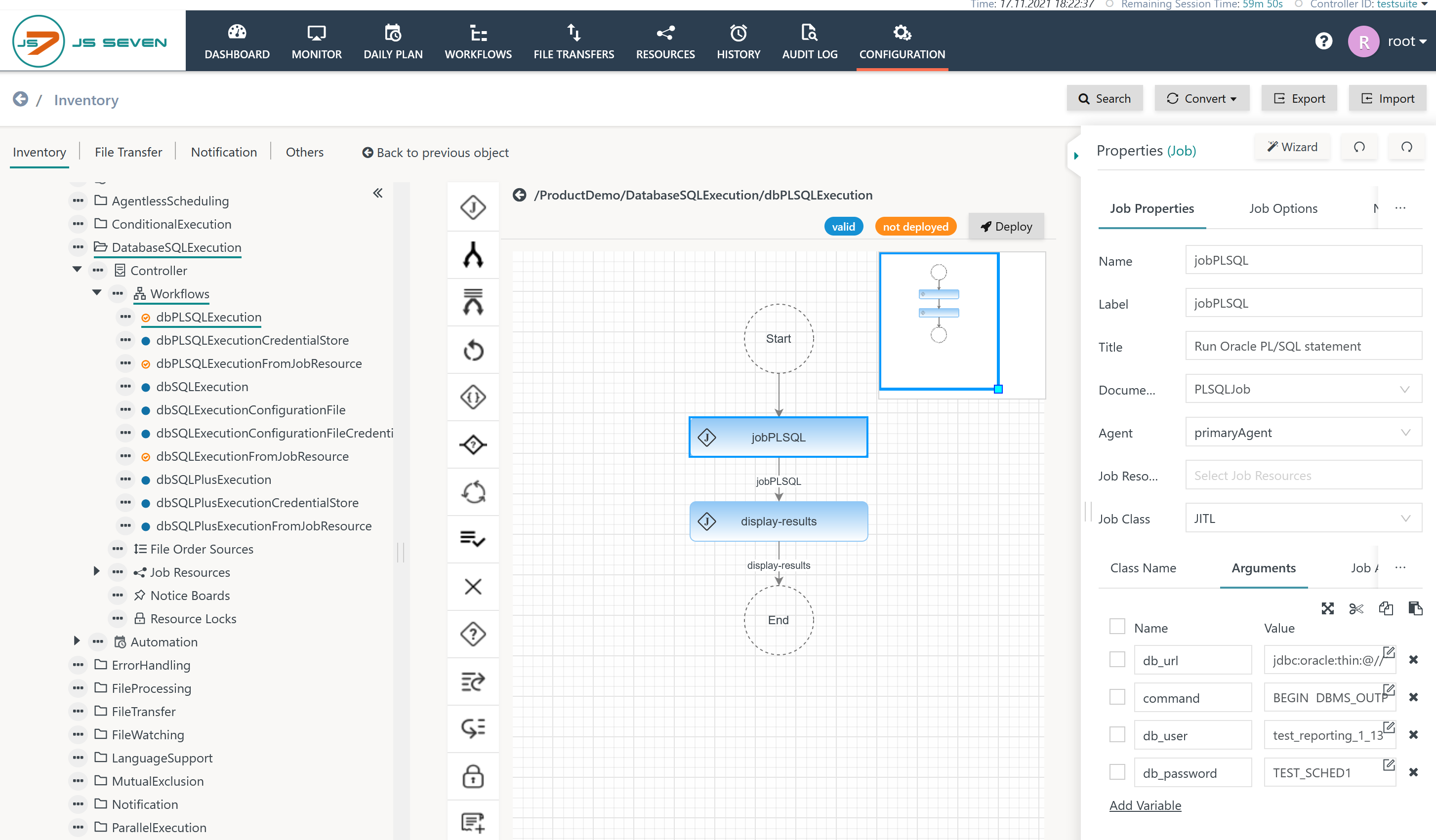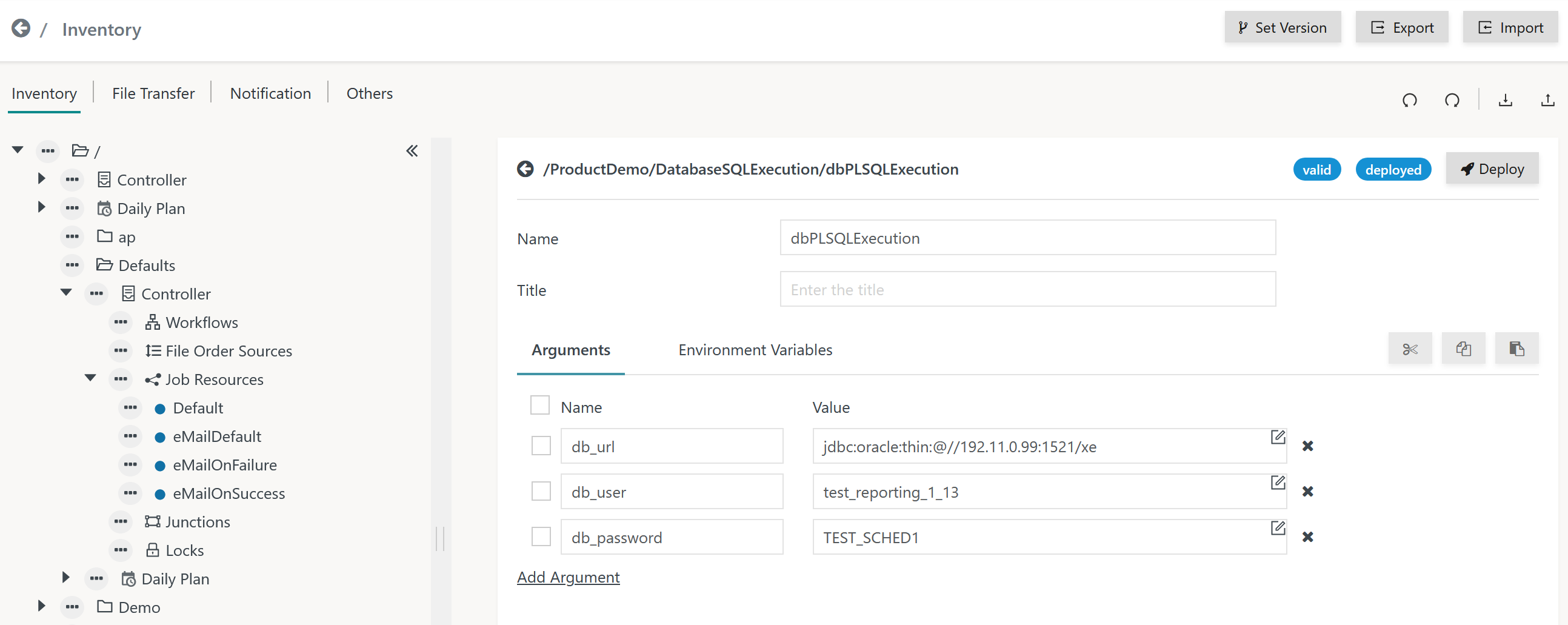Introduction
The JITL PLSQLJob provides a parameterizable interface for executing Oracle® PL/SQL statements.
JS7 offers out-of-the-box capabilities:
- for executing PL/SQL,
- for passing arguments to PL/SQL,
- for collecting and passing on the results of PL/SQL execution to subsequent jobs,
- for using a JS7 - Credential Store.
The PLSQLJob can be used to execute files that include PL/SQL statements.
The job supports encryption of database credentials if used with a Hibernate configuration file, see JS7 - How to encrypt and decrypt Database Credentials.
Changes
- Starting from Release 2.0.0 the PLSQLJob
- is implemented on top of the JDBC Interface of the Oracle® JDBC Driver,
- with a commit operation being performed by the Oracle® JDBC Driver when a connection is closed without an explicit commit or rollback.
- Starting from Release 2.7.1 the PLSQLJob
- is implemented using Hibernate,
- with no commit or rollback operation being performed when the connection is closed.
- Starting from Release 2.7.2 the PLSQLJob
- makes use of the Hikari connection pool that ships with Hibernate,
- performs a rollback operation when a connection is closed,
- closes the connection in the event that a cancel/force or suspend/force operation is performed on the order.
- JITL-743 - Getting issue details... STATUS
Usage
When defining the job either:
- invoke the Wizard that is available from the job properties tab in the Configuration view and select the JITL PLSQLJob and respective arguments from the Wizard
or
- specify the
JITLjob class andcom.sos.jitl.jobs.db.oracle.PLSQLJobJava class name and add arguments as explained in the documentation below.
Example
Download: dbPLSQLExecution.json
The following example explains the basic use of the PLSQLJob. The job executes PL/SQL anonymous code blocks - selecting the current system date and writing it to the stdout channel.
Documentation
The Job Documentation including the full list of arguments can be found under: https://www.sos-berlin.com/doc/JS7-JITL/PLSQLJob.xml
The PLSQLJob supports the following arguments:
Name | Purpose | Required | Default Value | Example |
|---|---|---|---|---|
| PL/SQL statements to be executed | One of these arguments has to be specified |
| |
command_script_file | PL/SQL statements from a file | /home/sos/some_script.sql | ||
| JDBC connection string | Either a DB URL, location of a Hibernate configuration file or a Credential Store reference is used. User and password for database access can be specified by arguments with the same name and can be omitted if an Oracle Wallet is used or can be specified with the Hibernate configuration file, from a Job Resource or from a Credential Store Reference. |
| |
| User name for database access | scott | ||
| Password for database access | tiger | ||
hibernate_configuration_file | Replaces db_url, db_user, db_password arguments from a hibernate configuration file. | ./config/private/hibernate.cfg.xml | ||
| Regular expression to parse output from the | no | ^SETs+(\\s)\\s*ISs(.*)$ | |
result_set_as_variables | Specifies how a result set is forwarded to order variables for subsequent jobs:
| no | ||
result_file | Specifies the path to a result file if the resultset_as_variables argument is used with one of the values csv, xml, json. An absolute path can be specified and a relative path can be used that starts from the Agent's working directory. | no | ||
credential_store_file | Location of a credential store database (*.kdbx) | false | ./config/private/jobs.kdbx | |
credential_store_key | Location of a credential store key file (*.key) | false | ./config/private/jobs.key |
The PLSQLJob can be used with a credential store to hold sensitive arguments. For use of the credential_store_* arguments see JS7 - Use of Credential Store with JITL Jobs.
Argument: command
PL/SQL code can be specified as the value of the command argument.
The following PL/SQL code creates output that can be parsed by use of the variable_parser_reg_expr argument to create workflow variables:
DECLARE
v_order_date DATE := SYSDATE;
BEGIN
SELECT SYSDATE INTO v_order_date FROM DUAL;
DBMS_OUTPUT.PUT_LINE(' +++ +++');
DBMS_OUTPUT.PUT_LINE('SET order_date IS '|| v_order_date);
DBMS_OUTPUT.PUT_LINE(' +++ +++');
END;
The following PL/SQL code creates a cursor that can be used to store the result set to a file when specifying the result_set_as_variables argument with one of the values csv, xml or json. In addition, the result_file argument is used to specify the file which selected data is written to.
DECLARE return_cursor SYS_REFCURSOR; BEGIN OPEN return_cursor FOR 'SELECT FIRST_NAME, LAST_NAME, AGE FROM EMPLOYEES'; END;
Argument: command_script_file
PL/SQL code can be used from from a file that is assigned this argument, for example:
./config/get_order.sql
Argument: db_url
The job requires a standard JDBC database connection string such as jdbc:oracle:thin:@localhost:1521:XE
Argument: db_user
This argument specifies the user account for a database schema which has been assigned the required privileges to execute the PL/SQL code.
Argument: db_password
This argument specifies the password for the user account given with the db_user argument.
Argument: variable_parser_reg_expr
This argument specifies a regular expression for parsing the output created by the the DBMS_OUTPUT package from the PL/SQL statements. For each match an order variable is created that is available for subsequent jobs. For example, the statement:
EXEC DBMS_OUTPUT.PUT_LINE( 'SET order_date IS ' || TO_CHAR(CURRENT_DATE, 'YYYY-MM-DD') );
writes the following output to the console:
SET order_date is 2021-05-04
The output will be parsed by the regular expression:
^SETs+(\\s)\\s*ISs(.*)$
and will result in an order variable:
order_date = "2021-05-04"
Subsequent jobs can make use of the $order_date variable.
Manage Arguments
Arguments from Job Resources
For example, database connection settings can be added to JS7 - Job Resources in order to be shared by a number of jobs. This allows central management of connections settings and limits visibility of passwords with individual database jobs.
The Job Resource is then assigned the job or workflow. As the same argument names have been used as for the Pl/SQL job they are automatically mapped to the job.
Passing Arguments to PL/SQL Code
Arguments can be passed to PL/SQL statements. Such arguments can be added to the PL/SQL code and will be replaced at run-time. The syntax for arguments includes stating ${VARIABLE} - such variables are replaced from any location in the PL/SQL script code. For example, a job argument or order variable with the name $dateFormat specifying the output format of a date can be added to PL/SQL script code like this:
The above example can be used:
- for PL/SQL code included as the value of the
commandargument. - for PL/SQL code included with a script file that is referenced by the
command_script_fileargument.
Manage Return Values
Passing PL/SQL results to subsequent instructions and jobs
JS7 jobs can create return values that are available for later instructions and jobs in a workflow. The PLSQLJob can pass on the result of PL/SQL execution, e.g. calculated dates, by use of the DBMS_OUTPUT package.
This package allows writing to the stdout channel that is checked by the PLSQLJob for patterns which indicate return values. The output is parsed by the PLSQLJob using a regular expression that is specified by the argument variable_parser_reg_expr. This defaults to ^SETs+(\\s)\\s*ISs(.*)$.
The following line of Pl/SQL code:
EXEC DBMS_OUTPUT.PUT_LINE( 'SET order_date IS ' || TO_CHAR(CURRENT_DATE, 'YYYY-MM-DD') );
results in output such as:
SET order_date IS 2021-05-04
The output will be parsed by the regular expression:
^SETs+(\\s)\\s*ISs(.*)$
and will result in an order variable:
$order_date = "2021-05-04"
Subsequent instructions and jobs can make use of the $order_date variable.
Return Variables automatically available from the PLSQLJob
This job automatically creates the following order variables which are available to subsequent instructions and jobs.
Return Variable: sql_error
- The
sql_errororder variable contains the error messages generated during PL/SQL execution. This variable will be empty if no errors occur.
Return Variable: std_out_output
- The
std_out_outputorder variable contains the messages spooled to the stdout channel by PL/SQL.
Cancellation
The following operations are available:
- The cancel operation is applied to the order, not to the PLSQLJob. In case of cancellation the job will continue until completion and the order will be set to the failed state.
- The cancel/force operation is applied to the order and to the job. The PLSQLJob will be forcibly terminated, transactions are rolled back, the database connection will be closed and the DBMS session will be terminated. The order will be set to the failed state.
Further Resources
- JS7 - JITL SQLPLUSJob
- JS7 - JITL SQLExecutorJob
- JS7 - JITL Common Variables
- JS7 - Job Resources
- JS7 - Use of Credential Store with JITL Jobs

